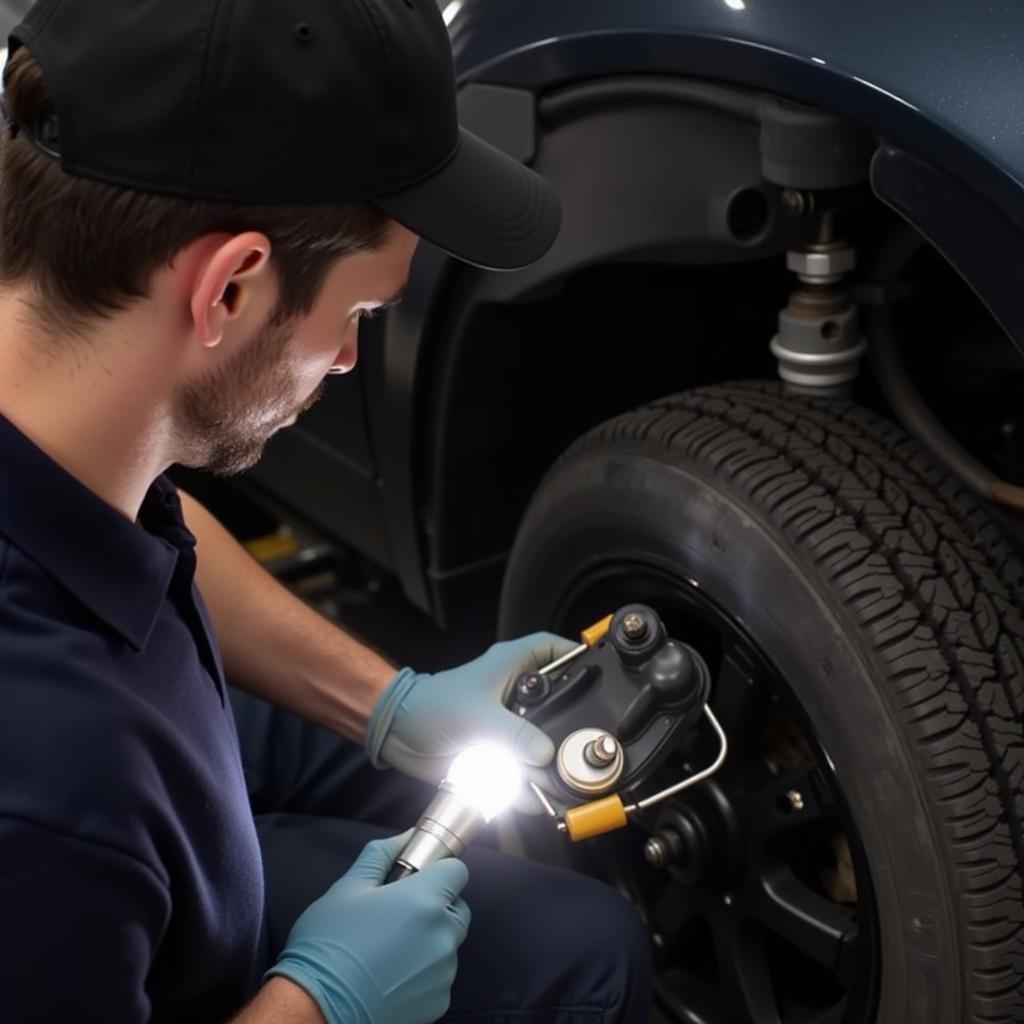If you’re driving your 2001 Chevy Tracker and the brake warning light suddenly illuminates on your dashboard, it’s a clear sign that something requires your immediate attention. This light is your vehicle’s way of communicating a potential issue within the braking system. Ignoring it could compromise your safety and lead to more severe problems down the road.
While a glowing brake warning light can be alarming, don’t panic! This article will guide you through the common reasons this light comes on in a 2001 Chevy Tracker and equip you with the knowledge to address the issue effectively.
Understanding Your Chevy Tracker’s Brake Warning Light
Before we delve into the specifics of why your brake warning light might be on, it’s crucial to understand what triggers it. This light is directly connected to several components within your braking system, including:
- Parking Brake: The most common culprit, especially if the light comes on as soon as you start your car, is an engaged parking brake.
- Brake Fluid Level: Low brake fluid is a serious issue. Your brake warning light will activate if the fluid level in the master cylinder drops below a safe level.
- Brake Pad Wear Sensors: Your Chevy Tracker is equipped with sensors that monitor brake pad wear. When the pads wear down to a certain point, these sensors trigger the brake warning light.
- ABS System Malfunction: While less common, a fault within your Anti-lock Braking System (ABS) can also trigger the brake warning light.
Common Reasons Your 2001 Chevy Tracker Brake Warning Light is On
Now, let’s explore the most frequent reasons behind a glowing brake warning light in a 2001 Chevy Tracker:
1. Engaged Parking Brake
As mentioned earlier, this is the most straightforward cause. Before panicking, ensure your parking brake is fully released. Sometimes, even a slight engagement can trigger the light.
2. Low Brake Fluid
Brake fluid is the lifeblood of your braking system. It transmits the force from your foot on the brake pedal to the wheels, enabling you to slow down and stop. If the fluid level is low, it usually indicates a leak somewhere in the system.
How to Check Your Brake Fluid:
- Locate the brake fluid reservoir under the hood of your Chevy Tracker. It’s typically a translucent plastic container with a black cap.
- Check the fluid level. There should be minimum and maximum markings on the side of the reservoir. The fluid level should fall between these lines.
- Important: If the fluid level is low, do not continue driving. Get your vehicle towed to a mechanic immediately to diagnose and repair the leak.
 Mechanic Checking Brake Fluid Level in a 2001 Chevy Tracker
Mechanic Checking Brake Fluid Level in a 2001 Chevy Tracker
3. Worn Brake Pads
Brake pads are designed to wear down over time. They create friction against the brake rotors, slowing your vehicle. When the pads wear too thin, the wear sensors come into contact with the rotors, completing a circuit and illuminating the brake warning light.
Note: Driving with severely worn brake pads can damage your rotors, leading to costly repairs.
4. Faulty ABS System
While less common than the other causes, a malfunctioning ABS system can also trigger the brake warning light. This is often accompanied by an illuminated ABS warning light on your dashboard.
What is ABS? The Anti-lock Braking System prevents your wheels from locking up during hard braking, helping you maintain steering control. A fault in this system requires immediate attention from a qualified mechanic.
“It’s important to remember that your brake warning light can sometimes be triggered by a faulty sensor,” says John Smith, a certified automotive electrician with over 20 years of experience. “Always have your braking system thoroughly inspected by a professional to accurately diagnose the problem.”
What to Do When Your Brake Warning Light Comes On
If your brake warning light comes on while driving, here’s a step-by-step guide:
- Stay Calm: Don’t panic! Pull over to a safe location as soon as possible.
- Check Your Parking Brake: Ensure it’s fully disengaged. If the light turns off, you’re good to go.
- Inspect Brake Fluid: If the parking brake isn’t the issue, carefully check your brake fluid level. Remember, if the level is low, do not drive further.
- Seek Professional Help: If the parking brake is disengaged and the brake fluid level is fine, it’s best to have your vehicle towed to a trusted mechanic. Driving with potentially worn brake pads or a faulty ABS system is extremely dangerous.
Conclusion
A glowing brake warning light in your 2001 Chevy Tracker should never be ignored. It’s crucial to understand the common causes and take appropriate action to ensure your safety and prevent further damage to your vehicle. Remember, regular brake inspections are essential for maintaining a safe and reliable braking system.

